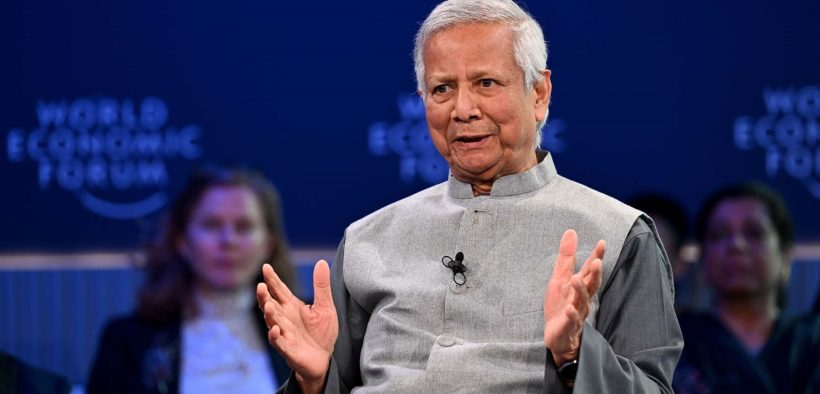Prof Yunus focuses on mechanisms to hold free, fair polls in Bangladesh

Chief Adviser Professor Muhammad Yunus joined conversation with the founder of the World Economic Forum Klaus Schwab in Switzerland on Thursday. Photo: PID
Chief Adviser Professor Muhammad Yunus has stressed the need for establishing a mechanism so that everyone in Bangladesh can vote freely and fairly, without any interruptions or threats.
He put the emphasis during a one-on-one conversation with the founder of the World Economic Forum Klaus Schwab at the annual meeting of the World Economic Forum in Davos on Thursday.
While sharing the background stories of the July mass uprising with the global audience, the Chief Adviser said the students took to the streets in Bangladesh in the July last year with a simple demand-equal opportunity for jobs.
He narrated how the students during their protest painted graffiti on the walls of Dhaka, expressing their desires and dreams.
Dr Yunus said all the young people who became voters over the last 16 years did not get a chance to vote, which is very unfortunate.
Presenting the reform agendas of the incumbent interim government, the 84-year-old economist and the 2006 Nobel Peace Prize winner said unless they know what kind of election the country’s people want, they cannot go into polls.
Mentioning that the government is waiting to hold an election, he said now the country’s people have to decide the process-whether they will go for the short agenda or the long agenda.
The Chief Adviser said they have targeted the end of this year for the election to take place if people go for a quick reform agenda.
“If people say, no – we need a longer list of reforms; we need another six months,” he said.
Terming the present generation as the most powerful generation in human history, the Chief Adviser said this is the generation of world having a huge potential.
About the role of students, he stated that technology has transformed them; they are no longer just Bangladeshi youths but they have become part of a global generation.
“We define that new Bangladesh and we are committed to creating that new Bangladesh,” Prof Yunus said.
The chief adviser said demands from the movement reflected a desire to move beyond the old Bangladesh and work towards creating a new one.
He talked about a consensus commission to build national unity, and based on the consensus of all parties and civil society organizations, they will prepare the “July Charter,” a document named after the month of July when a mass uprising took place in Bangladesh.
Prof Yunus said his government is also working to revive the Bangladesh’s economy – restoring foreign reserve and banking system.
Impressed by Dr Yunus’ speech, Klaus Schwab expressed his satisfaction over the half an hour conversation with the Nobel Peace Laureate.



 BSS
BSS










